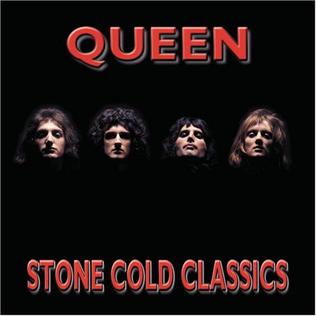See also
- "These Are the Days of Our Lives", a 1991 song by Queen
- "Days of Our Livez", a 1996 single by Bone Thugs-n-Harmony
- Queen: Days of Our Lives , a 2011 BBC documentary about the rock band Queen
Days of Our Lives is a U.S daytime soap opera airing on the NBC television network.
Days of Our Lives may also refer to:

Queen are a British rock band formed in London in 1970 by Freddie Mercury, Brian May and Roger Taylor, later joined by John Deacon (bass). Their earliest works were influenced by progressive rock, hard rock and heavy metal, but the band gradually ventured into more conventional and radio-friendly works by incorporating further styles, such as arena rock and pop rock.

"Under Pressure" is a song by the British rock band Queen and singer David Bowie. Originally released as a single in October 1981, it was later included on Queen's 1982 album Hot Space. The song reached number one on the UK Singles Chart, becoming Queen's second number-one hit in their home country and Bowie's third, and also charted in the top 10 in more than 10 countries around the world.

Roger Meddows Taylor is an English musician, singer, songwriter, multi-instrumentalist and the drummer for the rock band Queen. As a drummer, Taylor was recognised early in his career for his unique sound and was voted the eighth-greatest drummer in classic rock music history in a listener poll conducted by Planet Rock in 2005. He was inducted into the Rock and Roll Hall of Fame in 2001 as a member of Queen.

Queen II is the second studio album by the British rock band Queen. It was released on 8 March 1974 by EMI Records in the UK and Elektra Records in the US. It was recorded at Trident Studios and Langham 1 Studios, London, in August 1973 with co-producers Roy Thomas Baker and Robin Geoffrey Cable, and engineered by Mike Stone. It is significant for being the first album to contain elements of the band's signature sound of multi-layered overdubs, vocal harmonies, and varied musical styles.

A Night at the Opera is the fourth studio album by the British rock band Queen, released on 21 November 1975 by EMI Records in the United Kingdom and by Elektra Records in the United States. Produced by Roy Thomas Baker and Queen, it was reportedly the most expensive album ever recorded at the time of its release.

Innuendo is the fourteenth studio album by the British rock band Queen, released on 4 February 1991 by Parlophone in the United Kingdom and it is the band's first studio album to be released by Hollywood Records in the United States. Produced by David Richards and the band, it was the band's last album to be released in lead singer Freddie Mercury's lifetime, and their most recent one to be composed of entirely new material. It reached the No. 1 spot on the UK album charts for two weeks, and also peaked at No. 1 in Italy, the Netherlands, Germany, and Switzerland, staying at No. 1 for three weeks, four weeks, six weeks, and eight weeks, respectively. It was the first Queen album to go Gold in the US upon its release since The Works in 1984.

Hot Space is the tenth studio album by the British rock band Queen. It was released on 21 May 1982 by EMI Records in the UK and by Elektra Records in the US. Marking a notable shift in direction from their earlier work, they employed many elements of disco, funk, rhythm and blues, dance and pop music on the album. This made the album less popular with fans who preferred the traditional rock style they had come to associate with the band. Queen's decision to record a dance-oriented album germinated with the massive success of their 1980 hit "Another One Bites the Dust" in the US.

"I Was Born to Love You" is a 1985 song by Freddie Mercury, and was released as a single and on the Mr. Bad Guy album. After Mercury's death, Queen re-worked this song for their album Made in Heaven in 1995, by having the other members play their instrumental parts over the original track, transforming the song from a disco song to a rock song. The Queen version from the Made in Heaven album also includes samples of Mercury's ad-lib vocals taken from "A Kind of Magic" and from "Living on My Own".

"These Are the Days of Our Lives" is a song by the British rock band Queen. Although credited to the whole band, it was largely written by their drummer Roger Taylor, and is the eighth track on the band's 1991 album Innuendo.

Queen + Paul Rodgers was a collaboration between Queen and Paul Rodgers; formerly of Bad Company, Free, The Firm and The Law. Guitarist May had previously performed with Rodgers on several occasions, including a performance at the Royal Albert Hall.

Five Live is an EP released in 1993, featuring five tracks, performed by George Michael, Queen, and Lisa Stansfield. "Somebody to Love" and "These Are the Days of Our Lives" were recorded at the Freddie Mercury Tribute Concert, held on 20 April 1992, at Wembley Stadium.

Stone Cold Classics is a compilation album by English rock band Queen released on 11 April 2006, in conjunction with the broadcast of an episode of the U.S. television series American Idol, in which contestants performed songs from the Queen catalogue.

John Richard Deacon is an English retired musician, best known for being the bass guitarist for the rock band Queen. He wrote several songs for the group, including Top 10 hits "You're My Best Friend", "Another One Bites the Dust" and "I Want to Break Free"; co-wrote "Under Pressure", "Friends Will Be Friends" and "One Vision"; and he was involved in the band's financial management.

James Allen Otto is an American country music singer and songwriter. Otto began his career on Mercury Nashville Records in 2002, charting three minor singles on the Billboard Hot Country Songs charts and recording his debut album Days of Our Lives for the label before being dropped in 2004.

"Friends and Lovers" is a song written by Jay Gruska and Paul Gordon. The song was first recorded as a duet by Gloria Loring and Carl Anderson in 1985 for the soap opera Days of Our Lives, produced by Doug Lenier. That recording remained unreleased until the summer of 1986, when it was released shortly after a version by Juice Newton and Eddie Rabbitt hit country radio. The country version featured the altered title of "Both to Each Other ".
Marlena may refer to:

Danger Days: The True Lives of the Fabulous Killjoys is the fourth studio album by American rock band My Chemical Romance, released on November 22, 2010, by Reprise Records. Its songs are associated with the band's well known sound of alternative rock, pop punk, and punk rock, but also introduces new musical elements, including power pop, pop rock, and electronic rock. The primary musical inspiration for the album came from contemporary rock, psychedelic rock, and protopunk bands of the sixties and seventies. It was the final album released by the band before their six-year disbandment from 2013 to 2019.
I Still Love You can refer to:
"Sweet Lady" is a song by British rock band Queen, which was written by Queen guitarist Brian May.